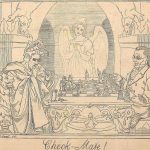A little over 2000 years ago, a group of men decided to put together a book of the historical documents and texts they had floating around. These men were of a tribal culture that had originated in the desert, herding animals and worshipping a warlike male god. This jealous male god is still with us today–his name is Jehovah; the book is the Bible. But at the time that the early Jews were commencing their archival efforts, they were under pressure from a neighboring tribe, a tribe that worshipped a nature goddess. These men did not want the goddess religion to prevail over their own people, who were starting to slip back into old ways. So the early Jewish priests and scribes adopted a foundation myth that battled the goddess by making women the enemy.
The first chapter in the Jewish Bible tells the story of Adam and Eve in the Garden of Eden. What most of us get from this story is that Eve ate the apple and that’s why we don’t live in Paradise anymore. The story is actually a bit more complicated than that. In Genesis, we learn that Adam was the first human being, and that he, a man, was created in the image of his creator — God. So right away, God is a man. A wrathful, authoritarian, my way or the highway kind of man. And just one of several Father gods to enthrall the Western world.
Later, after Adam complained of loneliness, God created a woman for Adam, and he called her Eve. Eve, the first woman and mother of all living, was not the equal of Adam, but his helper. And as the weaker of the two, she was open to temptation by the serpent, disobeyed God’s explicit orders, and ate of the Tree of Knowledge of Good and Evil. As a result, Eve was punished. God cursed her to be subservient to her husband forevermore.
As you might expect, that’s pretty much what male-fixated western man has done ever since–punished Eve. Never mind that you could just as easily say that Eve, acting intuitively, discovered Reason, elevating simple disobedience into a Promethean act. The founding Biblical fathers sided with God, and so we do not honor Eve.
Once Judaism and Christianity (and later Islam) settled in as the religions of the Western world, the denigration of women in cultures ruled by those religions was institutionalized. Women generally had few or no rights, no education, and no status in the world until the 20th century, a testament to the power of religion to control social structures. The curse of the forbidden fruit has proved to be long acting.
Under the early Church, there was some effort to accommodate the early goddess worshippers. Catholicism still affords women the role model of the Virgin Mary, who pale though she is compared to Mary Magdalene, is something at least. Through the custom of granting women sainthood and their own monastic tradition, women remained appeased, despite the witch burnings, inquisitions, and other iniquities perpetrated against their sex as the Church eradicated the last vestiges of Paganism.
It wasn’t until the Protestant Reformation came along that women were finally put firmly in their place as inferiors. The saints and Virgin Mary were banished along with other such sinful and womanly offerings as music, art, sculpture, flowers, carvings, or other evil frivolities. Anything pleasant, pleasing or pleasurable was outlawed and removed from these stern, masculine houses of religion. Women were veiled and dressed appropriately for their sexless role in the service of their husbands. The man of the house ruled supreme, just as God ruled the world of men.
It’s interesting to note that right about this time, in the early 1600s, the first ships from England to America were landing on the shores of New England, full of disgruntled Protestant pilgrims. These tough settlers were religious zealots of so conservative a stripe that the idea of leaving their native land to live in a complete wilderness populated with Indians seemed attractive. Together they founded the colony that brought us the Salem Witch Trials, dunking and stocks, and eventually The Declaration of Independence.
But in the years between 1620 and 1776, something else had come up that was to supercede the religious extremism of its founding. The Enlightenment was sweeping the English reading world, and with it, a cultural shift away from blind adherence to church and institutional authority, and toward a belief that all men could know the truth, sheerly by application of Reason. Eve’s sin may have introduced Reason as a blunt instrument, but the Enlightenment honed it to a precision tool. Suddenly the world opened up to a wide ranging inquiry, as modern men cast off the shackles of faith and tradition. Using nothing but their huge brains, Enlightenment men made huge advances in science, technology, mathematics and physics, although not surprisingly, poetry suffered during this period.
Surely this Enlightenment must have been a good thing then, freeing us from rigid thinking and false intellectual barriers? Yes and no. We were free, but at a price. For even in the midst of the joyous liberation of mankind from intellectual slavery, there were voices of warning. Descartes, writing in the mid 1600s, spends considerable time and energy coming up with the maxim “I think, therefore I am.” Cogito, ergo sum, he says. Trés simple. All you need is your brain, your ability to think. Everything else is secondary or false, including the unmediated evidence of your senses and the subtle murmurs of intuition.
Ultimately, Descartes was concerned with the mind-body split, which to this day is regarded as a problem, and is a direct consequence of the kind of thinking that can generate Cogito, ergo sum to begin with. In his solution to the mind-body problem, Descartes conveniently made the body go away, codifying the new reality in which man was now forced to live — by rational mind alone. Later philosophers expanded on the idea of rational man, and continue to grapple with its issues to this day. But in the post-Enlightenment era, more practical men also picked up the message, and they used the ideals of reason and objectivity to create a new venue for themselves in science and technology.
For the gift of the Enlightenment to modern man was surely Science. Rigorous, masculinist, Science offered men the illusion of certainty, a sure path to the truth. Today, we have made a god of Science, if by god we mean that which cannot be questioned. Who doubts today that scientific principles are the best way to run a country, a health care facility, an educational system, or a prison? But it’s no wonder. We have been taught blind adherence to the efficacy of science to solve all of our problems and we know no other way.
The fact is, we trust science, but we don’t really. Because we’ve seen what unfettered science can do. Science gives us genetic engineering, high-rise apartments, chemotherapy, ritalin, genetically modified food, cloning, factory meat, animal testing, herbicides, pesticides, toxic chemicals, environmental health disorders, air pollution, SUVs, nuclear weapons, biowarfare, chemical weapons, designer viruses, Mad Cow Disease, water shortages, educational testing, advertising, political polls, lockdown, privatized prisons, slavery, indentured servitude, cubicles, anti-depressants, bauhaus architecture, stun guns, modernity, globalization, democracy, dioxin, animal extinction, habitat loss, androgynous frogs, mercury-laden fish, humvees, modern warfare, regime change, climate change, soullessness, homelessness, poverty, disease, police states, weapons of mass destruction, dredge nets, resource extraction, environmental devastation, free trade, planned development, urban sprawl, mental confusion, television, addiction, lovelessness, chronic fatigue, death…
This is just a partial list of the things Science has given us, and the list of things we have lost is just as long. And yet, most Western people, and Americans in particular, continue to extoll the virtues of science as the only way, whatever science may have us doing. The trouble is, science, being scientific, can justify anything. Want to see what happens when you cut a monkey’s head open while it’s awake and alive? Science can pose the question, create the experiment, perform it multiple times, and write up the results for a scientific journal, with nary a pang of conscience to slow the gathering of data. The scientific method itself precludes subjective reasoning — the application of heart, intuition, or conscience to the process of ‘doing science.’ Once envisioned as a tool to help man understand his world, it’s become a binding philosophy used to justify massive exploitation.
From blaming Eve to deifying Science — how will it all end? Or do we even need to ask the question? It doesn’t take a scientist to see that the supremacy of ‘masculine’ Science at the expense of ‘feminine’ Intuition has left us psychically and culturally deformed. Today, Science justifies even the worst atrocities, while seeking only abstract ideals like victory, profits, wealth, expansion. It’s clear we need the goddess back.
Getting her back won’t be easy though. Western man is now laboring under more than 3,000 years of cultural conditioning, leaving us desperately wanting but blind to our predicament. We can’t continue like this. And yet we can’t change. The answer, as usual with this sort of thing, is very simple and also well nigh impossible. We need to heal the mind-body split, balance the masculine and the feminine, and while we’re at it, abolish abstractions like Money, the State, and the Church. In short, we need to go back to the time before Eden, and try again. The way things are going, Science may just take us there, whether we’re ready or not.




